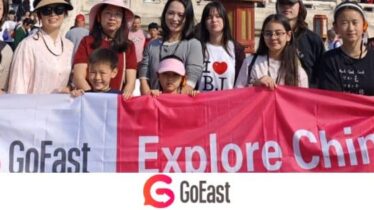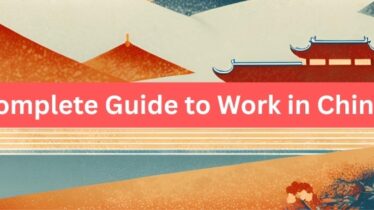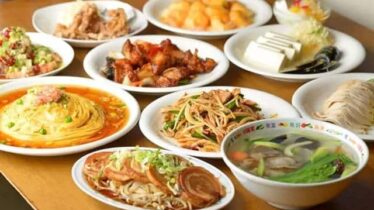Chinese Lantern Festival: Traditions and Riddles
Lantern Festival, 元宵节(yuánxiāo jié), is an important part of the Chinese New Year. It falls on the fifteenth day of the first lunar month. In 2025, it falls on Feb.12th, Wednesday.
Teachers at GoEast have prepared the essential knowledge about the festival and fun Chinese riddles you can play with your Chinese family and friends or impress them!
Origins & Legends: Why Do We Celebrate the Lantern Festival?
The festival’s origins are shrouded in myths and historical events. Here are the four most captivating stories:
-
The Heavenly Deception (汉朝传说 – hàn cháo chuán shuō)
Emperor Wu of Han (汉武帝) worshipped Taiyi, the celestial god. To appease the heavens after hunters killed a sacred swan, villagers hung red lanterns (红灯笼 hóng dēnglóng) and lit fireworks to mimic a firestorm, tricking the Jade Emperor into sparing humanity. -
The Taoist Rebellion (道教起义- dào jiào qǐ yì)
Taoist leader Zhang Daoling (张道陵) led an uprising against tyranny on the fifteenth day of the first lunar month. Victorious communities lit lanterns to celebrate freedom, a tradition still alive today. -
The “Ping lǚ” Rebellion Memorial (平吕之乱 – píng lǚ zhī luàn)
After suppressing the Lü Clan’s rebellion during the Han Dynasty, Emperor Wen declared the fifteenth day of the first lunar month a day of lantern-lighting to honor peace. -
Buddhist Tribute (敬佛传说 – jìng fú chuán shuō)
Some believe the festival honors Buddha’s enlightenment. Lighting lanterns symbolizes awakening wisdom (智慧 zhìhuì) and dispelling ignorance.
Custom: 7Lantern Festival Traditions You Can’t Miss
吃元宵/汤圆chī yuánxiāo/tāngyuán-Eating Glutinous Rice Balls
元宵(yuánxiāo) and 汤圆(tāngyuán) are ball-shaped dumplings made with glutinous rice flour, usually filled with sesame or peanut powder, and sugar. In some parts of China, people also eat 汤圆(tāngyuán) filled with vegetables and meat.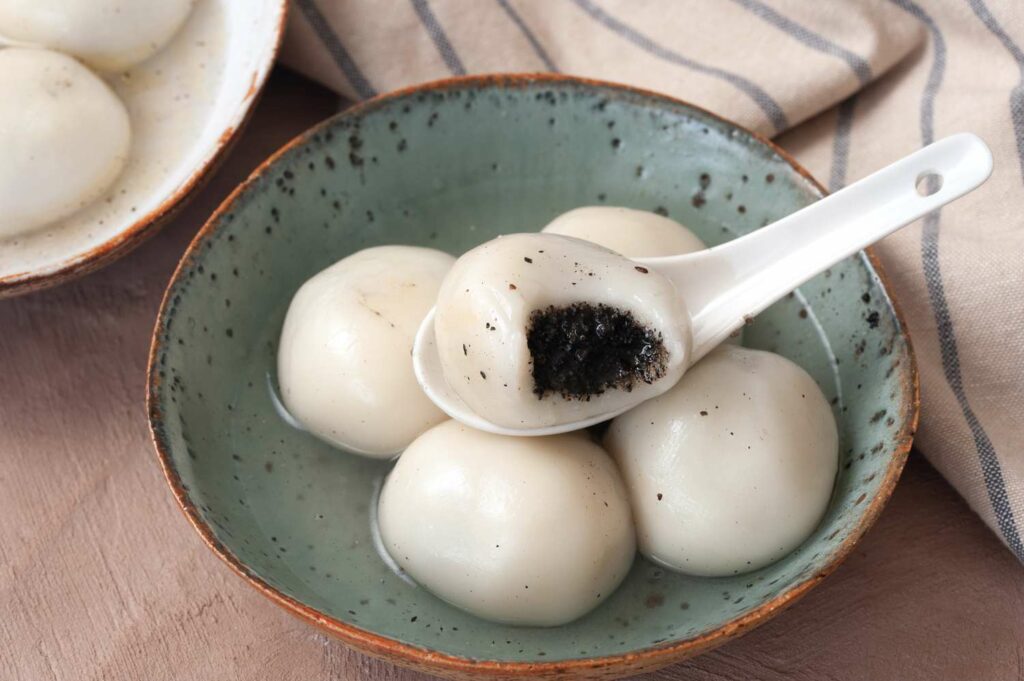
In the northern part of China, people eat 元宵(yuánxiāo). But in the southern part of China, people eat 汤圆(tāngyuán). The difference lies in how you make them:
元宵(yuánxiāo) are made by putting the filling into a basket full of glutinous rice flour and shaking it, letting the 元宵(yuánxiāo) roll up, and as the filling is coated with the flour.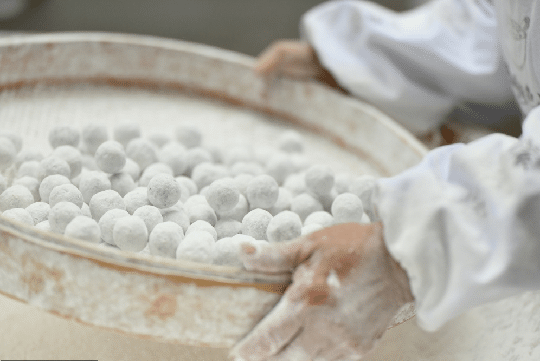
汤圆(tāngyuán) are made by making glutinous rice flour dough and wrapping the filling inside.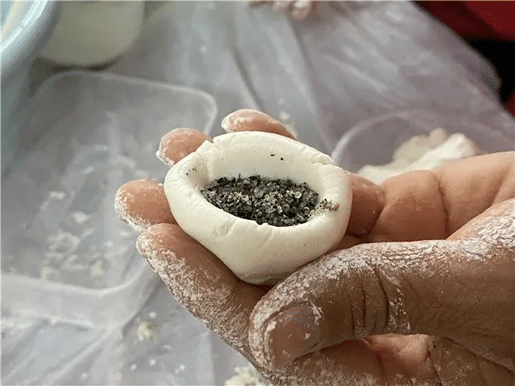
Because of the shape, eating元宵(yuánxiāo) /汤圆(tāngyuán) also symbolizes reunion, peace happiness.
赏花灯shǎng huādēng-Lanterns
At Lantern Festival, people go to the fair to see beautiful lanterns. Lanterns can be in different shapes, themes, and colours. You can see dragon lanterns, revolving lanterns, palace lanterns, flower lanterns, and zodiac animal lanterns are the most popular ones.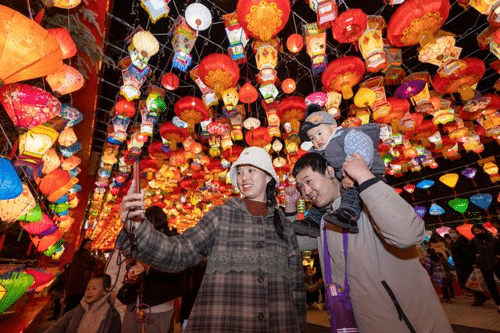
猜灯谜cāi dēngmí-Solving riddles
Solving riddles is one of the fun activities at the Lantern Festival. It has been popular since the Song Dynasty. During the Lantern Festival, people write riddles on paper and stick them on colourful lanterns for people to solve. We have prepared some Chinese riddles at the end of the article so you can play with your Chinese family and friends.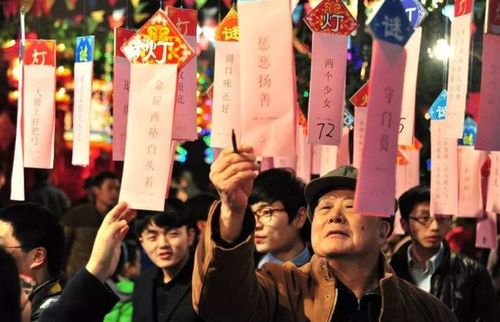
舞龙wǔlóng-Dragon Dance
The dragon dance is one of the traditional Chinese cultural activities. The dragon dance originated from people’s worship of the dragon. At every festival, people dance the dragon to pray for peace and a good harvest.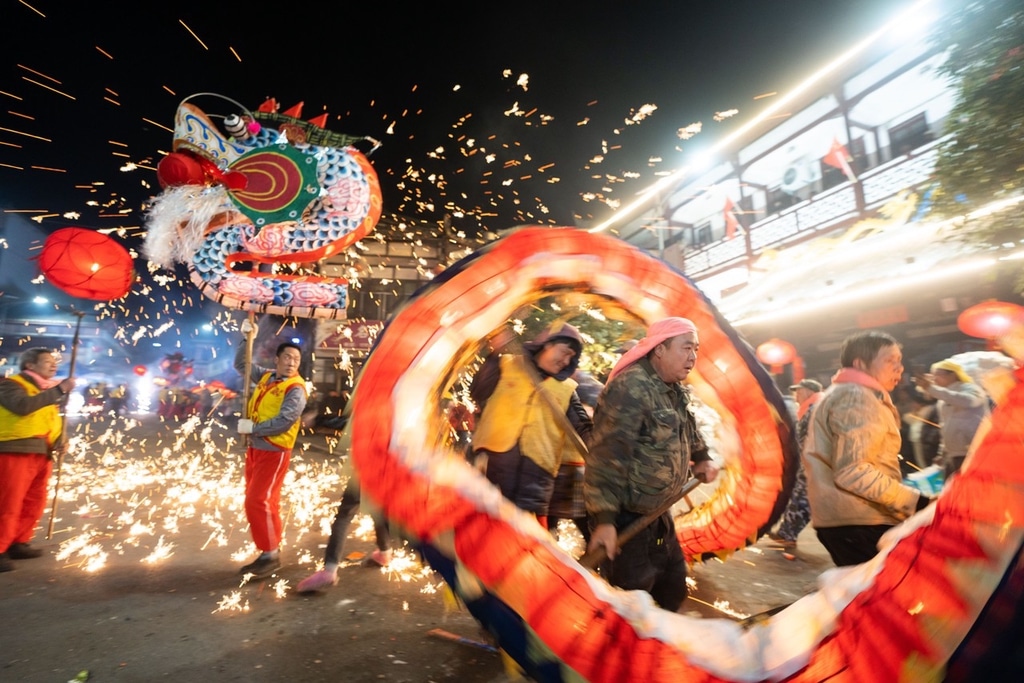
舞狮wǔshī-Lion Dance
People believe that lions are auspicious beasts, and lion dances can bring good luck. Therefore, during the festivals or other celebrations, lion dances will be performed amidst bursts of gongs, drums, and firecrackers to help celebrate and pray for good luck.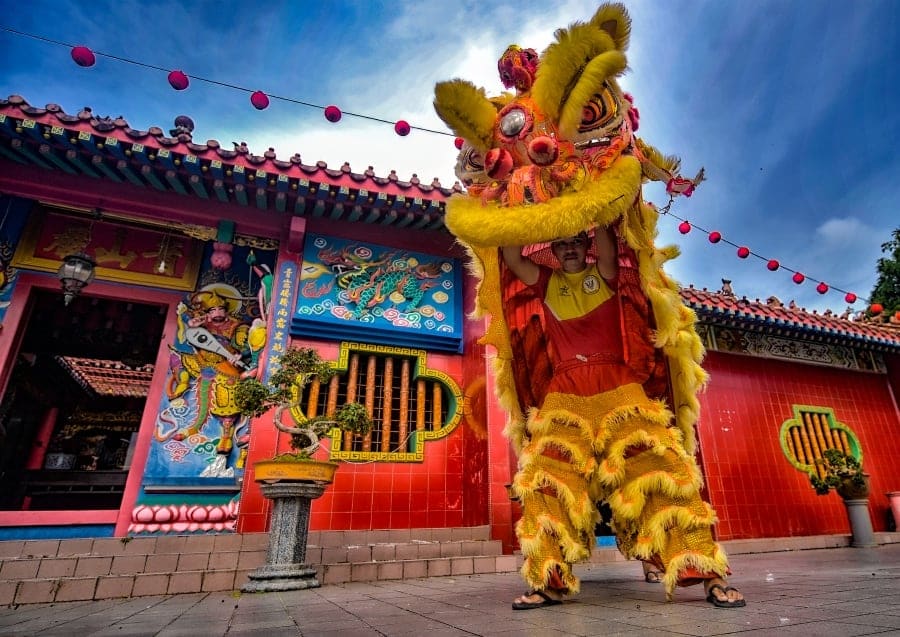
踩高跷 cǎi gāoqiāo – Stilt Walking & Folk Performances
Watch acrobats balance on towering stilts – a nod to ancient harvest celebrations.
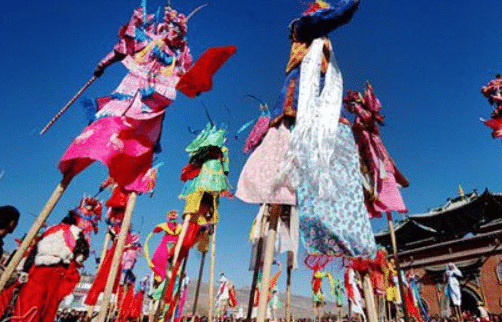
放水灯 fàng shuǐdēng – Floating Lanterns
In some river towns, people release lotus-shaped lanterns carrying wishes for health, love, or success.
Food: Beyond Tangyuan
-
Tangyuan (汤圆) vs. Yuanxiao (元宵)
- Tangyuan: Southern China’s soft, sweet rice balls with fillings like sesame (芝麻 zhīma) or red bean (红豆 hóngdòu).
- Yuanxiao: Northern China’s firmer, rolled version with rock sugar and rose petals.
-
Savory Delights
- Jiu niang yuánzi (酒酿圆子): Tangyuan in fermented rice wine soup.
- Yú (鱼): Whole fish symbolizing abundance (“surplus” in Chinese).
-
Regional Specialties
- Guangdong: fā gāo (发糕) prosperity cakes.
- Zhejiang: lóng xū gāo (龙须糕) crispy sweet pastries.
Fun Facts about Lantern Festival
The Lantern Festival is also a romantic festival among traditional Chinese festivals. In feudal society, young girls were not allowed to go out freely. But on the night of the Lantern Festival, they were allowed to view the lantern lights in groups. Lantern Festival provides an opportunity for unmarried men and women to meet and find love. So the Lantern Festival can be the authentic Chinese Valentine’s Day.
Essential Lantern Festival Vocabulary & Phrases
15 Key Terms for Learners
| Chinese | Pinyin | English |
|---|---|---|
| 元宵节 | Yuánxiāo Jié | Lantern Festival |
| 赏花灯 | Shǎng huādēng | Admire festive lanterns |
| 舞龙 | Wǔ lóngdēng | Dragon dance |
| 猜灯谜 | Cāi dēngmí | Solve lantern riddles |
| 踩高跷 | Cǎi gāoqiāo | Stilt walking |
| 放天灯 | Fàng tiāndēng | Release sky lanterns |
| 阖家团圆 | Hé jiā tuányuán | Family reunion |
| 花好月圆 | Huā hǎo yuè yuán | Perfect blooms under the full moon |
| 祭月 | Jì yuè | Moon worship ritual |
| 灯市 | Dēng shì | Lantern fair |
8 Festive Greetings
- 元宵节阖家欢乐! (Yuánxiāo Jié hé jiā huānlè!) – “Joy to your whole family!”
- 月圆人圆事事圆! (Yuè yuán rén yuán shì shì yuán!) – “May the moon, people, and all matters be圆满 (complete)!”
- 好运连连! (Hǎoyùn liánlián!) – “Endless luck!”
- 五福临门! (Wǔ fú lín mén!) – “Five blessings at your door!” (Longevity, wealth, health, virtue, peace)
- 灯火万家,喜气盈门! (Dēnghuǒ wàn jiā, xǐqì yíng mén!) – “Ten thousand lanterns light homes; joy fills every door!”
Riddles you can play with your family and friends.
The Unique Hanzi Riddles
1. 一加一yī jiā yī
2. 山上还有山shān shàng hái yǒu shān
3. 一百减一yībǎi jiǎn yī
4. 一家十一口yī jiā shí yī kǒu
5. 十五天shí wǔ tiān
6. 正字少一横 zhèng zì shǎo yī héng
7. 多一半 duō yī bàn
(answers: 1. 王wáng 2.出chū 3.白bái 4.吉jí 5.胖pàng 6.止zhǐ 7. 夕xī)
The Fun Descriptive Riddles
1. 吃的是草,挤的是奶。Chī de shì cǎo, jǐ de shì nǎi.
2. 红口袋,绿口袋,有人害怕有人爱。hóng kǒudài, lǜ kǒudài, yǒurén hàipà yǒurén ài.
3. 两姐妹,一样长,酸甜苦辣她们先尝。liǎng jiěmèi, yīyàng cháng, suāntiánkǔlà tāmen xiān cháng.
4. 远看像只猫,近看像只鸟,天天上夜班,抓鼠是专家。yuǎn kàn xiàng zhǐ māo, jìn kàn xiàng zhǐ niǎo, tiāntiān shàng yèbān, zhuā shǔ shì zhuānjiā.
5. 天热忙,天冷忙,不冷不热它不忙。tiān rè máng, tiān lěng máng, bù lěng bù rè tā bù máng.
6.它像糖,它不甜;它像盐,它不咸;冬天有时一片,夏天谁都不见。tā xiàng táng, tā bù tián; tā xiàng yán, tā bù xián; dōngtiān yǒushíyīpiàn, xiàtiān shéi dōu bùjiàn.
7. 说马不像马,路上没有它,若用它做药,要到海中抓。shuō mǎ bù xiàng mǎ, lùshàng méiyǒu tā, ruò yòng tā zuò yào, yào dào hǎizhōng zhuā.
8. 中间是火山,四边是大海,海里宝贝多,快快捞上来。zhōngjiān shì huǒshān, sìbiān shì dàhǎi, hǎilǐ bǎobèi duō, kuài kuài lāo shànglái.
9. 年纪不算大,胡子一大把,不管见到谁,都爱叫爸爸。niánjì bù suàn dà, húzi yī dà bǎ, bùguǎn jiàn dào shéi, dōu ài jiào bàba.
-山羊shānyáng
(Answers: 1.奶牛nǎiniú 2.辣椒làjiāo 3.筷子kuàizi 4.猫头鹰māotóuyīng 5.空调kōngtiáo 6.雪xuě 7.海马hǎimǎ 8.火锅huǒguō 9.山羊)


